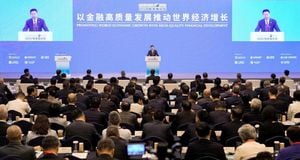Air pollution has become one of the most pressing environmental issues for Delhi, the capital city of India, particularly during the winter months. Recently, Congress leader Shashi Tharoor raised alarms about the dire air quality, labeling it as not only hazardous but also questioning Delhi's function as the nation's capital under such circumstances. His remarks come as the city grapples with pollutant levels exceeding dangerous thresholds, with the Air Quality Index (AQI) reaching alarming highs.
On November 18, Tharoor took to social media platform X to voice his frustrations. He highlighted the grim reality of Delhi's pollution levels, claiming they are nearly five times worse than those of Dhaka, which is currently the second-most polluted city globally. Tharoor called Delhi's air quality "unconscionable" and emphasized, "Our government has been witnessing this nightmare for years and does nothing about it." It's hard to ignore the gravity of his statements, especially when he pointed out the severe health risks linked to prolonged exposure to such levels of pollution.
Delhi's air pollution crisis is not new; it's been building up for years, particularly exacerbated by seasonal factors like stubble burning and meteorological conditions. Tharoor, who has been advocating for improved air quality since 2015, noted his efforts to convene discussions through Air Quality Round Tables, aimed at addressing this crisis. Unfortunately, he abandoned this initiative last year due to lack of progress, saying no one seemed to care about the issue. This situation has reached such extremes, he contended, it raises the question: should Delhi even remain the capital of India?
The air quality has been particularly disastrous recently, with levels hitting staggering figures—for example, on November 19, the AQI soared to 493, marking it as the highest for the current season, effectively declaring it "uninhabitable" for many residents. Tharoor’s remarks point to the severe limitations on daily life during the winter months when pollution peaks. He argues, "This city is uninhabitable from November to January and barely livable the rest of the year," prompting citizens and officials alike to reconsider the sustainability of having Delhi as the capital.
With smog enveloping the region for multiple consecutive days, the residents of Delhi have become accustomed to wearing masks and avoiding outdoor activities. The government has classified the pollution situation as a 'medical emergency,' prompting drastic responses, including shifting schools and colleges to online classes to protect students. Many areas like Anand Vihar and Ashok Vihar recorded AQI levels of around 500—classified as severe-plus—leading authorities to enforce stricter regulations under the Graded Response Action Plan (GRAP), particularly Stage 4.
The recent debate around Delhi's status as the capital raised by Tharoor resonates widely. Many residents are beginning to feel the effects of such high pollution levels on their health, with respiratory ailments on the rise. This issue has become political ammunition, with various leaders criticizing the central government’s lack of initiative to tackle the growing crisis. Tharoor’s call for change seeks to mobilize public discourse around the government’s accountability concerning environment policies.
Several opposition leaders have come out to echo similar sentiments, expressing frustration at the government’s apparent indifference. Notably, amid this public outcry, Chief Minister Arvind Kejriwal has responded by reiteratively linking the pollution crisis to policy decisions made at the central government level, citing stubble burning and construction activities as significant contributing factors.
Tharoor's reflections shed light on the stark reality facing millions of people in Delhi as they struggle to breathe clean air. The impact of air pollution goes beyond just health risks. Economic repercussions also loom large, as reduced productivity and increased health costs put heavy burdens on both families and the overall economy. Residents have started to take to social media, highlighting their daily challenges, sharing their experiences with health issues, and unitedly calling for action from the government.
The combination of aggravation among the populace and the palpable sense of urgency from elected officials like Tharoor reflects not just frustration, but also hope for future reforms. Advocates argue for comprehensive plans to address air quality—from stricter emission regulations to improved waste management practices and promotion of public transport. Measures like these could be integral to reviving the air quality and, by extension, the public's trust.
This back-and-forth between politicians, activists, and residents indicates the growing public demand for accountability and decisive action to mitigate pollution. Many believe it’s imperative for the government to prioritize long-term planning rather than reactive measures, which often emerge only during peak pollution seasons.
Despite the contentious atmosphere, there is evidence of progress being made, with some neighborhoods beginning to implement more rigorous standards aimed at pollution control. Public awareness campaigns are starting to take root, educating citizens about the ramifications of pollution as well as measures to protect themselves.
Nonetheless, the overarching situation remains fraught with challenges, as policies struggle to catch up with reality. The public's growing frustration underlines the necessity for systemic reforms and fosters hope for future generations to breathe cleaner air.
Tharoor’s stark question reverberates throughout the city: Is it time to rethink Delhi's status as the national capital? The air pollution crisis serves as not just a local issue, but one reflecting broader challenges faced by urban centers around the world. Each day brings renewed urgency to address the air quality issue as residents brace themselves against the elements, hoping for change and cleaner air not just for themselves, but for generations to come.



